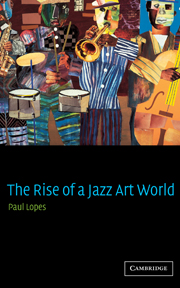Book contents
- Frontmatter
- Contents
- Acknowledgments
- Introduction: The quest for cultural legitimacy
- 1 Before the Jazz Age: professional musicians and good music
- 2 The Jazz Age: professional musicians and the cultivated vernacular
- 3 The swing craze: professional musicians, swing music, and the art of improvisation
- 4 The rise of a jazz art world: jazz enthusiasts, professional musicians, and the modernist revolt
- 5 The New Jazz Age: the jazz art world and the modern jazz renaissance
- Conclusion: The jazz art world and American culture
- Bibliography
- Index
1 - Before the Jazz Age: professional musicians and good music
Published online by Cambridge University Press: 22 September 2009
- Frontmatter
- Contents
- Acknowledgments
- Introduction: The quest for cultural legitimacy
- 1 Before the Jazz Age: professional musicians and good music
- 2 The Jazz Age: professional musicians and the cultivated vernacular
- 3 The swing craze: professional musicians, swing music, and the art of improvisation
- 4 The rise of a jazz art world: jazz enthusiasts, professional musicians, and the modernist revolt
- 5 The New Jazz Age: the jazz art world and the modern jazz renaissance
- Conclusion: The jazz art world and American culture
- Bibliography
- Index
Summary
We often hear complaints from musicians, especially band and orchestral, that they do not receive as much consideration and respect from the public as men of similar social status, but in other trades or professions … The musician, who is worthy the name, devotes his time unremittingly to his art, hence slander, or misapprehension, goes on unrefuted, so far as he is concerned. He is generally a man of a speculative turn of mind, dwelling apart, in realms of fancy, from the hurry-scurry of the world, apt to be sensitive and feel slights easily, but withal a good, honest citizen, who attends to his own business; and does not interfere with that of his neighbor … let some of those gentlemen who despise the musician, or who think his calling is an easy one, take a violin, or any other instrument in hand for a moment, try the most simple tune, or endeavor to play a common scale, then give their opinion … For the unremitting toil of the musical career, as well as for the social qualities of the musician, we claim that true musicians are worthy of the highest respect and consideration.
Editorial, Metronome, May 1885: 4The first issue of Metronome was published in January 1885 and quickly established itself as a major national magazine for professional musicians in the United States. The Carl Fischer Company, a supplier of musical instruments and music sheets, published this “ad sheet” in New York City.
- Type
- Chapter
- Information
- The Rise of a Jazz Art World , pp. 11 - 45Publisher: Cambridge University PressPrint publication year: 2002



